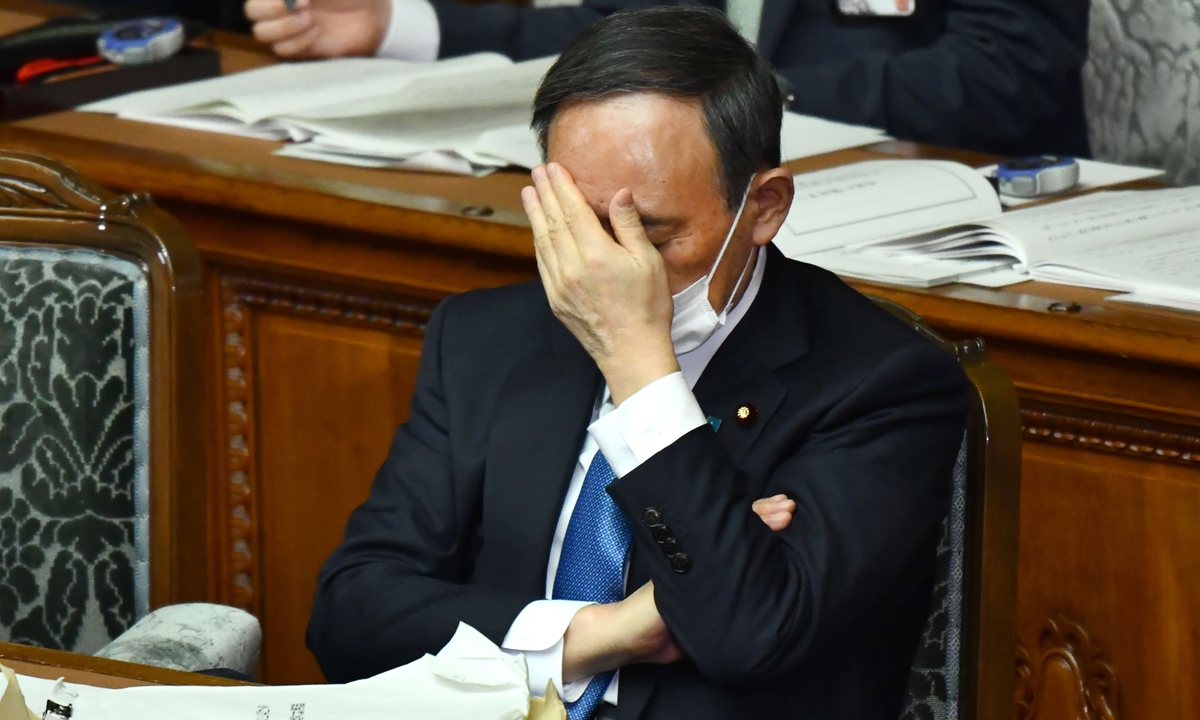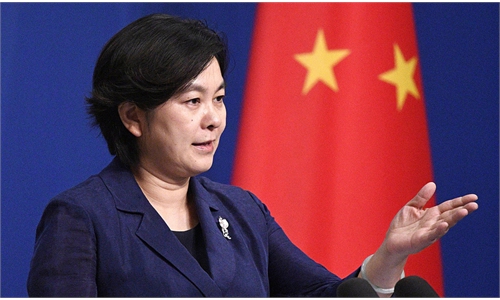China urges Japan to draw line under militarism after Suga’s cabinet members’ visit to war-linked Yasukuni shrine

Japan's Prime Minister Yoshihide Suga gestures after delivering his policy speech at the lower house of parliament in Tokyo in January. Photo: VCG
China expressed firm opposition to some Japanese senior politicians over the Yasukuni shrine issue and has lodged solemn representations with Japan, urging the country to completely draw a line under militarism, according to the Chinese Foreign Ministry and Chinese Embassy in Japan on Sunday, right after Suga sent a ritual offering and some cabinet members visited the shrine on the day that marks the 76th anniversary of Japan's surrender in World War II.
Yasukuni shrine is a spiritual tool and symbol of the Japanese militarism and its war of aggression where 14 Class-A war criminals of WWII who committed heinous crimes are honored, said Hua Chunying, a spokesperson of the Chinese Foreign Ministry. The visits of Suga cabinet's members not only violated historical justice, but are also a serious injury to the feelings of people from Asian countries, including China, which were victimized during the war.
China has lodged solemn representations with Japan over the issue, Hua said.
The ministry and the embassy on Sunday in separate statement slammed the wrong attitude of Japan on its crime of aggression and urged the nation to draw lessons from history, face up to and reflect upon its history of aggression and make a clear break with militarism.
Experts reached by the Global Times warned against the resurgence of militarism and called to blacklist cabinet members who visited the shrine while in office. They slammed Japan's moves as being in disregard of the bad impact on China-Japan relations.
Experts believe such a high-level visit to the controversial shrine is due to Japan's ruling Liberal Democratic Party (LDP) seeking to boost its popularity and gain a political advantage ahead of the LDP presidential election. The recent geopolitics, especially the tense China-US relations, also feed Japan's courage and provocation against China.
Three Japanese members of Japanese Prime Minister Yoshihide Suga's cabinet visited the Yasukuni shrine on Sunday, according to Kyodo News.
The three are Environment Minister Shinjiro Koizumi, Education Minister Koichi Hagiuda and World Expo Minister Shinji Inoue. Their visit came on the heels of two other Cabinet members' visit to Yasukuni on Friday, which already triggered protests from China and South Korea.
Besides, Suga sent a ritual offering through his secretary, Japanese media reported.
Meanwhile, Japanese former prime minister Shinzo Abe made a trip to the shrine on Sunday, telling reporters his visit is to "pay respects to those who gave their lives" for the country, according to Kyodo News.
In a speech to commemorate the day, Suga vowed that Japan would not wage war again, but Suga did not mention Japan's responsibility for WWII, Asahi Shimbun said on Sunday. Suga's speech largely reflected the same language as Abe's speech when in office at the usual national memorial service for Japan's war dead, the report said.
Earlier, China's Ministry of National Defense expressed strong opposition to the Japanese defense minister's visit to the shrine on Friday.
Lü Xiaoqing, the executive vice president of the China Society of Sino-Japanese Relations History and former counselor of the Chinese Embassy in Japan, told the Global Times on Sunday that August 15 is unusual as the world is suffering from the COVID-19 outbreak and the integration of the global economy is challenged. Human society needs solidarity more than ever.
However, even after the Tokyo Olympics, an international event symbolizing peace, Japan has failed to revere history and respect the current peace, which is deeply regrettable, Lü said.
"August 15 is a day worth commemorating as it means some countries were free from colonial rule. However, Japanese politicians' visits to the shrine are equally rubbing salt in the wounds of Asian people and openly challenging the bottom line of righteous revenge and human conscience," Da Zhigang, director of the Institute of Northeast Asian Studies at Heilongjiang Provincial Academy of Social Sciences, told the Global Times.
Lü told the Global Times that "China has zero tolerance relating to the shrine" and called for China to blacklist Japanese cabinet members who visit the shrine while in office.
At the same time, a sense of defiance of history is seemingly crammed with Japanese public opinion. Newspaper Yomiuri Shimbun on Sunday accused Japan's neigbors of using the issue of historical understanding to carry out anti-Japanese propaganda and Nikkei glorified the war as a memory of the past and said the war is fading away.
Da told the Global Times such rightward public opinions echoed the visit of Japanese politicians to Yasukuni shrine, who intended to seek political gains in upcoming election.
The topic of "76th anniversary of Japan's surrender in WWII" topped Chinese social media trend on Sunday, setting off a sense of public sentiment against Japanese politicians' visit to the shrine. The related hashtag garnered more than 2.6 billion views as of press time.
Chinese netizens also expressed strong sentiments on social media, such as "we should not forget the national humiliation, we should strive for self-improvement."
The sense was further fermented as it just came as actor Zhang Zhehan caught posing at Yasukuni shrine rouse great wrath. Zhang was facing an industry boycott as China Association of Performing Arts on Sunday urged to ban Zhang engaging the performing industry and all corporate brands which endorsed and contracted him had terminated cooperation with Zhang.



